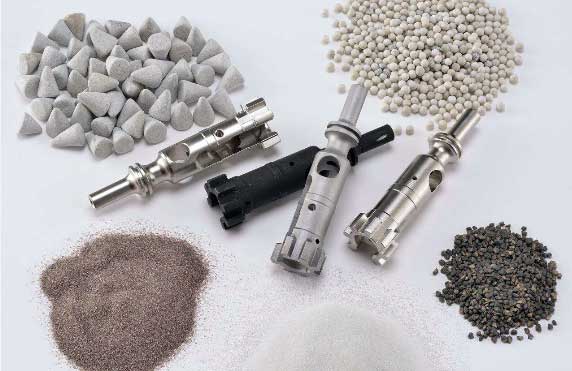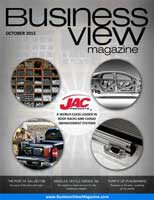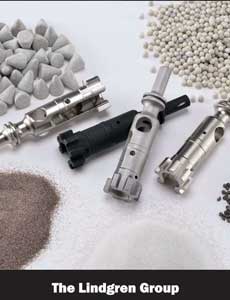Making metal last
Porosity, Nickel Boron, Chromate Conversion, Passivate, Electroless Nickel, Hexavalent Chrome, RoHs, Molybdenum Disulfide, Anti-Galling, Sulfuric Anodizing, Anodic & Cathodic, Vibratory Deburring, Vapor Degreasing, Hardcoat– these are all terms whose meanings might very well elude most of us – even if we could pronounce them correctly. They are, however, very well understood and very important to anyone involved in the art and science of metal finishing. They describe some of the elements and processes that finishers employ to coat and protect the myriad number of tools, machine parts, and countless other metal objects that all of us come into contact with, everyday of our lives.
Since its founding in 1971, The Lindgren Group of Minneapolis, Minnesota, has been a recognized leader in the metal finishing industry. The two companies which comprise the Group are Nico Products and Avtec Finishing Systems. “In the beginning, it was Nico Products,” says Mike Roberg, General Manager of Avtec. “There was a group of owners that started that company. Two of the owners split away in the mid ‘80s. They continued to own Nico Products, but they went out on their own and bought Avtec as a separate entity. Avtec started in 1978 in the electroless nickel market. A few years later they added aluminum anodizing.”
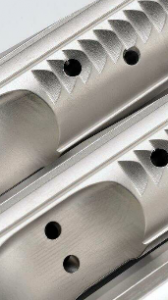 Today, the two companies, which have facilities about 15 miles apart from one another, are complimentary in terms of the products and services they offer. Rick Michalec of the Business Development group describes The Lindgren Group’s customer base: “Our customers vary; anyone who’s working with metal is a potential customer of ours. If they work with metal, we can work with them – from large OEMs, down to small, mom-and-pop machine shops. They send us product that we service and we send it back to them.” Roberg adds: “We’re job-shop platers – we don’t produce a product, we provide the finish, which is critical to the application’s success.”
Today, the two companies, which have facilities about 15 miles apart from one another, are complimentary in terms of the products and services they offer. Rick Michalec of the Business Development group describes The Lindgren Group’s customer base: “Our customers vary; anyone who’s working with metal is a potential customer of ours. If they work with metal, we can work with them – from large OEMs, down to small, mom-and-pop machine shops. They send us product that we service and we send it back to them.” Roberg adds: “We’re job-shop platers – we don’t produce a product, we provide the finish, which is critical to the application’s success.”
Ken Barnes also works within the Business Development group. He elaborates further: “We can work with virtually anybody. We can work with machine shops, casting facilities, metal stampers; we work with recreational products, aerospace and defense-type products, automotive, and a whole host of commercial applications, as well. We provide 60 to 70 percent of the chemical finishes that are available in the market. The majority of our business is within a three to four-hour drive of either facility, but we do have customers throughout the country. We do most of our work in the Midwest – we’ve got customers in Kansas and Michigan – but also the East coast, California, and Canada. And because of our growth, certifications, OEM approvals, and our national reputation, now, we do see more opportunities throughout the country.”
With all the multifarious ways in which metals differ from one another – in their molecular and chemical makeup, in their behaviors when combining with other metals and coatings, and in the uses to which they are ultimately put – many of The Lindgren Group’s customers rely on the company’s expertise and deep knowledge of all the appropriate processes and available coatings and finishes. Michalec explains: “Sometimes people know exactly what they want based on specifications and information that they receive from their customers, but sometimes they don’t. They just know what the end use of the product is, so they choose to work with us on the R & D. We’ll help them troubleshoot problems and figure out the best finish for it, and if it’s a finish we offer, we’ll do it; if it’s a finish we don’t offer, we’ll try to steer them in the right direction.”
Barnes agrees. “That’s a very important distinction between our company and some of the other metal finishers out there,” he says. “We can help our customer base-engineer products to achieve their desired outcome, whether that’s better wear-protection, corrosion-protection, or aesthetics. Our entire team here will work with engineering groups, upfront, to help them in the design of their parts and the appropriate specifications as they go forward.” Michalec adds: “We’re constantly adding new finishes based on what the market needs or our customer base needs. If they want something, and they talk to us about it, we’ll R & D their finish, and put it in.
This focused expertise, combined with Lindgren’s many investments in its quality systems over the years, has garnered the type of certifications and approvals that distinguish this company from its competition. “There are a lot of metal-finishing companies out there that can offer many of the same type of services that we do,” says Barnes, “but there’s a much smaller segment of the market that holds professional certifications like we do. We are ISO 9001 Certified; we’re also NADCAP Certified, which allows us to do aerospace and defense work. And those certifications really speak to the high level of quality systems that we have in place at both facilities. That’s really been a point of growth for our company. Auditors prefer to deal with companies that have these systems in place because it makes doing business with them easier. They’re recognized standards in the marketplace and they understand that the companies that have these certifications really have their act together.”
NADCAP (National Aerospace and Defense Contractors 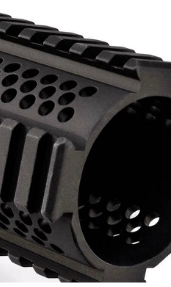 Accreditation Program) is a global-wide certification that standardizes all the finishing processes for the aerospace and defense sectors. “Because of our NADCAP accreditation,” Barnes explains, “we’re well-suited to work with the ‘prime’ manufacturers and their supply chain.” Lindgren also holds a Federal Firearms License and considers the processing of firearms work a key part of its portfolio of services. “We do a vast array of gun parts with a number of different coatings,” he says. “We offer finishing from start to finish on gun parts, including blasting, coating options, solid film lubricants, etc. So we are a one-stop processor for this work. That’s a really important market to our company and one in which we’ve done a terrific job bringing work in from all over the country.”
Accreditation Program) is a global-wide certification that standardizes all the finishing processes for the aerospace and defense sectors. “Because of our NADCAP accreditation,” Barnes explains, “we’re well-suited to work with the ‘prime’ manufacturers and their supply chain.” Lindgren also holds a Federal Firearms License and considers the processing of firearms work a key part of its portfolio of services. “We do a vast array of gun parts with a number of different coatings,” he says. “We offer finishing from start to finish on gun parts, including blasting, coating options, solid film lubricants, etc. So we are a one-stop processor for this work. That’s a really important market to our company and one in which we’ve done a terrific job bringing work in from all over the country.”
As The Lindgren Group moves forward, according to Barnes, its management team is constantly involved in strategic planning in order to help identify what the company needs to do to continue to prosper and grow. This includes markets that it may want to enter; new finishes that may compliment its current product line; as well as ways in which it can better serve its customers – especially those companies that require some of Lindgren’s well-earned certifications.
But Roberg says that there is an even more significant initiative that the company is currently exploring, which will better help position it for a viable future: “One of the biggest things on our list right now is employee development. We know that in this employee market, there’s going to be a challenge in the next few years, certainly in the next ten years, to have people with a lot of depth and knowledge. So we know that we need to spend more on our training, and our employee development, and retainability, because that’s probably going to be more important to us than capital investment in the next five years.”
“It’s really key that we understand who’s out there looking for jobs,” he continues, “because the landscape is changing and we need to respond to the times. Employees are looking for something different on the job than they did twenty or thirty years ago and we’re coming to understand that, maybe a little bit quicker than our competitors. We’re also understanding that pay is a huge issue and comfort level on the job is a huge issue, and if we can provide that, and we can train our employees to provide what our needs are, we feel as though we will have a very low turnover, our cost-of-quality will be very low, and our profitability will be much higher. And we’ll be able to sustain that mechanism of good pay, good earnings, and good profit margin. So really, in a sense the employees are the key to success.”
Barnes also emphasizes the importance of employee satisfaction and the company’s desire to train and maintain its work force: “It’s important that people understand when they come to work here that there’s a career path for them. This isn’t just an hourly-wage job. We want to develop people who want to find a career and be here for the long-term. So we want to do a good job of defining employee expectations and letting them know that this is a career opportunity.” Once again, Michalec sums it up: “We want to develop our employees by teaching and training them on the necessary skills to exceed, set standards, and take care of them both personally and professionally.”
Finally, what propels The Lindgren Group’s business model is its continuing desire to find materials and coatings that will help make metal last longer. “Throughout the last four or five decades,” says Roberg, “it’s been greatly recognized that there’s a huge loss every year – trillions of dollars in the world economy – just due to corrosion of metal parts. Metal finishing has been a kind of an asset in the sense that it’s offset that to some degree. If you can find the magic, like in developments in carbon fibers or the lightweight structure of aluminum, or finishes on aluminum – all of these things add up to less loss to the economy and less repair of infrastructure over and over and over. These finishes came to be because we want products to last longer. That’s really what it comes down to.”
Without metal, there would be no modern civilization. By protecting metals and the many parts and objects made from them against corrosion, as well as from the normal wear and tear that occurs within contemporary, mechanical equipment, The Lindgren Group, in applying its sophisticated chemistry and refined procedures, works daily to make sure that our modern civilization lasts, at least, a little longer.
AT A GLANCE
WHO: The Lindgren Group
WHAT: A recognized leader in the metal finishing industry
WHERE: Minneapolis, Minnesota
WEBSITE: www.thelindgrengroup.com
PREFERRED VENDORS
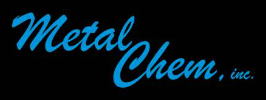
Metal Chem Inc. – Metal Chem is a specialty chemical business that works to develop, manufacture, and service pretreatment, post-treatment, and waste treatment products used in the metal finishing industry. With nearly 30 years in operation, Metal Chem distinguishes itself through the entire cycle of pretreatment to wastewater treatment chemistries. The company’s RoHS and ELV-compliant Electroless Nickel products offer unmatched consistency and longevity on ferrous and non-ferrous alloys. With dedicated mixing vessels and the strictest quality control standards, its customers enjoy the added assurance that all products acquired from Metal Chem meet or exceed the standards of all other chemistries today. The company’s manufacturing facility is located in Greer, South Carolina. – www.metalchem-inc.com
